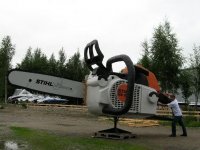You are using an out of date browser. It may not display this or other websites correctly.
You should upgrade or use an alternative browser.
You should upgrade or use an alternative browser.
What oil is best? and what ratio?
- Thread starter DexterDay
- Start date
Kozak Logging
Well-Known OPE Member
- Local time
- 12:42 AM
- User ID
- 548
- Joined
- Jan 15, 2016
- Messages
- 122
- Reaction score
- 201
- Location
- Wisconsin
Most all I stated was based from personal work experience as well as backed up by online articles backed up from trusted agencies and places that did tests for the truth. No two people will agree on the same thing. This is why a GAS OR OIL THREAD doesn't do much good for a forum. Its the same arguenment. Just go to Bobistheoilguy, they have some of the top testers for oil and non oil products and I guarentee you most of the guys there are some of the smartest people in the world. Some anaylize and test all day and night. With proof of what I said. Its just how it goes. Some agree and some disagree. Either way I know what I know from personal experience and testing with a temp gauge and egt tuner. Numbers don't lie.
Keith Gandy
Maxima K2 40:1 87 Pump Gas
- Local time
- 12:42 AM
- User ID
- 341
- Joined
- Dec 30, 2015
- Messages
- 6,219
- Reaction score
- 16,241
- Location
- Provencal, Louisiana
Simple enough.
bwalker
Pinnacle OPE Member
- Local time
- 1:42 AM
- User ID
- 523
- Joined
- Jan 12, 2016
- Messages
- 2,083
- Reaction score
- 4,835
- Location
- Montana
Suffice to say your online sources are not correct. Not to be a jerk, but there are so many old wives tales out there it's ridiculous.Most all I stated was based from personal work experience as well as backed up by online articles backed up from trusted agencies and places that did tests for the truth. No two people will agree on the same thing. This is why a GAS OR OIL THREAD doesn't do much good for a forum. Its the same arguenment. Just go to Bobistheoilguy, they have some of the top testers for oil and non oil products and I guarentee you most of the guys there are some of the smartest people in the world. Some anaylize and test all day and night. With proof of what I said. Its just how it goes. Some agree and some disagree. Either way I know what I know from personal experience and testing with a temp gauge and egt tuner. Numbers don't lie.
And corelation isn't causation.
I might add that there is always factually accurate and factually innaccurate. What you have posted is factually innaccurate.
Last edited:
Keith Gandy
Maxima K2 40:1 87 Pump Gas
- Local time
- 12:42 AM
- User ID
- 341
- Joined
- Dec 30, 2015
- Messages
- 6,219
- Reaction score
- 16,241
- Location
- Provencal, Louisiana
The 110 was right at 2 sec. Slower by my counting
Keith Gandy
Maxima K2 40:1 87 Pump Gas
- Local time
- 12:42 AM
- User ID
- 341
- Joined
- Dec 30, 2015
- Messages
- 6,219
- Reaction score
- 16,241
- Location
- Provencal, Louisiana
Mike that 550 had alot less rpm in cut with the 110
bwalker
Pinnacle OPE Member
- Local time
- 1:42 AM
- User ID
- 523
- Joined
- Jan 12, 2016
- Messages
- 2,083
- Reaction score
- 4,835
- Location
- Montana
That's really not the case. What high octane fuels do is resist the formation of active radicals that lead to abnormal combustion. They don't inhibit or slow down normal combustion at all. In fact the faster you can combust the lower your chance of detonation in the first place.In a normal spark-ignition engine, the air-fuel mixture is heated due to being compressed and is then triggered to burn rapidly by the spark plug and ignition system. If it is heated or compressed too much, then it will explode when triggered, or even self-ignite before the ignition system sparks. This causes much higher pressures than engine components are designed for and can cause a "knocking" or "pinging" sound. Knocking can cause major engine damage if severe.
Octane ratings are not indicators of the energy content of fuels. (See Effects below and Heat of combustion). They are only a measure of the fuel's tendency to burn in a controlled manner, rather than exploding in an uncontrolled manner.
Higher octane ratings correlate to higher activation energies: the amount of applied energy required to initiate combustion. Since higher octane fuels have higher activation energy requirements, it is less likely that a given compression will cause uncontrolled ignition, otherwise known as auto ignition or detonation.
The way I am reading that is - the higher the octane the more compression it's going to take to run it properly. I don't see a chainsaw having enough.
In regards to online sources be very careful. Wiki and the like are often not accurate or factual and this subject in particular has lots of information that's false.
Last edited:
mdavlee
Hillbilly grinder
- Local time
- 1:42 AM
- User ID
- 279
- Joined
- Dec 28, 2015
- Messages
- 14,194
- Reaction score
- 64,634
- Location
- TN
Yep. It took 20 cuts to get it to run that good on it. Way too high of octane for a saw. The 7900 was about the same and it has a little more compression than the 550.Mike that 550 had alot less rpm in cut with the 110
mdavlee
Hillbilly grinder
- Local time
- 1:42 AM
- User ID
- 279
- Joined
- Dec 28, 2015
- Messages
- 14,194
- Reaction score
- 64,634
- Location
- TN
I ended up dumping a half gallon of the 110 out. It was that crappy for saws. The only one that ran decent on it was the 395 when on a mill. It was turning 12.3k or so and was still down on power a little. I ran one tank and then went back to 93.
bwalker
Pinnacle OPE Member
- Local time
- 1:42 AM
- User ID
- 523
- Joined
- Jan 12, 2016
- Messages
- 2,083
- Reaction score
- 4,835
- Location
- Montana
You can forget about detonation in a woods ported saw. I would worry alot more about ethanol.yeah dont even need to time them. The 110 is slower for sure than the 93.
And we've seen vids were 87 looks better than 94 I think it was?
Seems to me - we want to get as closer on the low end then go up. But gotta avoid the detonation...which you can't tell.
So based on this idea - I'd test 87 and 91 and hope that 91 was just as fast. If so I'd use 91 as insurance...rather use 91 then have some detonation.
actually 87 91 and 93-94 would be a nice test. If they were all the same then again I'd use 91 as the book calls for minimum 89.
Kozak Logging
Well-Known OPE Member
- Local time
- 12:42 AM
- User ID
- 548
- Joined
- Jan 15, 2016
- Messages
- 122
- Reaction score
- 201
- Location
- Wisconsin
What I would like to see if your facts of findings and proof of wiseful tests. Personally as a dynometer operator, I have witnessed it first hand. I won't argue with you. I will just state the facts that every forum has a guy who knows it all, I will confess that I'm not that guy. But you argue with everything everybody has stated, so you must know it all. I'm going to take something from you and keep it for my self. My signature will be "Bwalker is the great and wise yoda" Please continue on. I'm listeningSuffice to say your online sources are not correct. Not to be a jerk, but there are so many old wives tales out there it's ridiculous.
And corelation isn't causation.
I might add that there is always factually accurate and factually innaccurate. What you have posted is factually innaccurate.
bwalker
Pinnacle OPE Member
- Local time
- 1:42 AM
- User ID
- 523
- Joined
- Jan 12, 2016
- Messages
- 2,083
- Reaction score
- 4,835
- Location
- Montana
That particular 110 sure did, we can say that for certain. What we can't say is what caused it. Although I would think that an excessive end point and possible a good portion of the lower boiling point components boiled off given its from a pump contributed to what we have seen.well it doesn't matter now, since mike just posted those videos. Whatever the actual reasons are...
The bottom line is - 110 ran noticeably slower than 93.
bwalker
Pinnacle OPE Member
- Local time
- 1:42 AM
- User ID
- 523
- Joined
- Jan 12, 2016
- Messages
- 2,083
- Reaction score
- 4,835
- Location
- Montana
Its not my job to do research for you.What I would like to see if your facts of findings and proof of wiseful tests. Personally as a dynometer operator, I have witnessed it first hand. I won't argue with you. I will just state the facts that every forum has a guy who knows it all, I will confess that I'm not that guy. But you argue with everything everybody has stated, so you must know it all. I'm going to take something from you and keep it for my self. My signature will be "Bwalker is the great and wise yoda" Please continue on. I'm listening
A dyno collects data. Data which still needs to be interpreted..
Kozak Logging
Well-Known OPE Member
- Local time
- 12:42 AM
- User ID
- 548
- Joined
- Jan 15, 2016
- Messages
- 122
- Reaction score
- 201
- Location
- Wisconsin
Its not my job to do research for you.
A dyno collects data. Data which still needs to be interpreted..
Have you ever ran an dyno before? If not, then I know what I collected and interpreted. Its why I won races as well as the people I did builds for. Its alright man. I proved my sucess with facts, wins and trophies. Good day.
Kozak Logging
Well-Known OPE Member
- Local time
- 12:42 AM
- User ID
- 548
- Joined
- Jan 15, 2016
- Messages
- 122
- Reaction score
- 201
- Location
- Wisconsin
It was the atom mass, protrons and electrons weighed in with the neutrons. I have no clue on what that means, but I know for a fact thats the reason, a substance is made up of a atomic mass."that particular 110" oh good grief.
bwalker
Pinnacle OPE Member
- Local time
- 1:42 AM
- User ID
- 523
- Joined
- Jan 12, 2016
- Messages
- 2,083
- Reaction score
- 4,835
- Location
- Montana
I sure have...Have you ever ran an dyno before? If not, then I know what I collected and interpreted. Its why I won races as well as the people I did builds for. Its alright man. I proved my sucess with facts, wins and trophies. Good day.
Keith Gandy
Maxima K2 40:1 87 Pump Gas
- Local time
- 12:42 AM
- User ID
- 341
- Joined
- Dec 30, 2015
- Messages
- 6,219
- Reaction score
- 16,241
- Location
- Provencal, Louisiana
Kozak Logging
Well-Known OPE Member
- Local time
- 12:42 AM
- User ID
- 548
- Joined
- Jan 15, 2016
- Messages
- 122
- Reaction score
- 201
- Location
- Wisconsin
Sounds like a good test to start with. I'm still trying to figure out what mix there running in the two saws below.I'm not wasting my time on this arguing crap again. Moving forward. The next step would be to test.
87 vs 91 vs 93-94. If 93-94 was slower, that would add final confirmation to mike's test of 110 vs 93.


Similar threads
- Replies
- 68
- Views
- 9K







